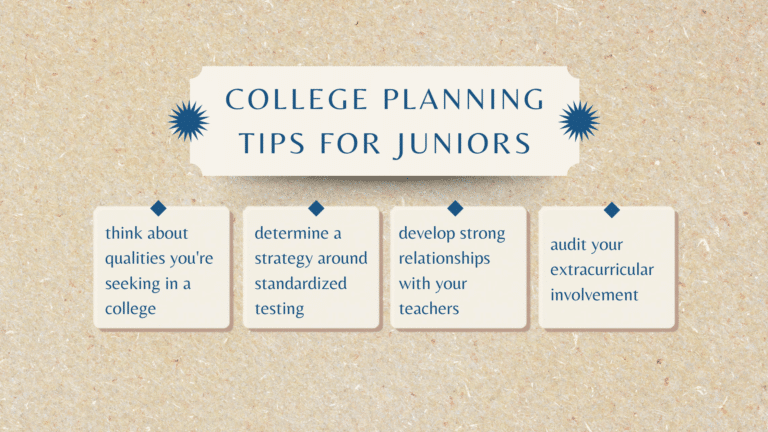Join Our Email List
Get the latest admissions tips and
announcements right in your inbox!
announcements right in your inbox!
We respect your privacy. Unsubscribe at any time.

High school juniors have a lot to manage. The college admissions process may feel far away, but it will be here before you know it.
Just one year from now, most (or all) of your college applications will already be submitted.
Let that sink in for a minute!
A lot has to happen in the next year, but the load is completely manageable with some thoughtful planning.
One of the first steps is to begin thinking about what qualities you’re seeking in a college. Like any big “shopping trip,” it’s important to see what’s out there, so you know what the options are. Take advantage of high school vacation days to visit colleges, even ones close to home. If you’re able, your high school spring break can be a great time to see colleges while they’re in session. Attend college fairs in your area. You can also engage with many colleges virtually through their websites.
It’s also important to determine a strategy around standardized testing. Investigate whether the types of schools you’re targeting require the ACT or SAT or have announced a policy for your entering class. If you decide to pursue standardized testing (generally recommended to optimize your college options), decide whether you’ll take the ACT or SAT and when you will test. Be sure to leave yourself sufficient time to properly prepare for and retake the test if you choose. While students can test into their senior year, deciding whether to report scores can get tricky with early college deadlines and colleges’ differing testing policies. Advance planning may avoid the need to make difficult, last-minute decisions.
Now is a good time to develop strong relationships with your teachers. Typically, students ask 1-2 teachers in core academic subjects (English, math, social studies, science, and world language) to write letters of recommendation on their behalf. Junior year teachers are ideal because they will have known you for an entire school year, the one that’s most recent at the time you apply to college. If you take time to get to know your teachers (and ask for help if you need it), you’ll be more engaged in your learning and provide excellent fodder for your future letters of recommendation.
Lastly, audit your extracurricular involvement. Lean into the activities you truly enjoy and consider letting go of the ones that don’t excite you. Look for ways to deepen your involvement—leadership can take many forms and isn’t limited to formal titles! As you’re starting to think about potential college majors, seek out related activities. Doing so will help hone your interests and also potentially generate content for your future college essays.
We know it’s not easy to incorporate college planning into your already busy junior year schedules. However, with a few simple steps and some forethought, you can avoid unnecessary fire drills during the fall of your senior year.
Your senior self will definitely thank you!
